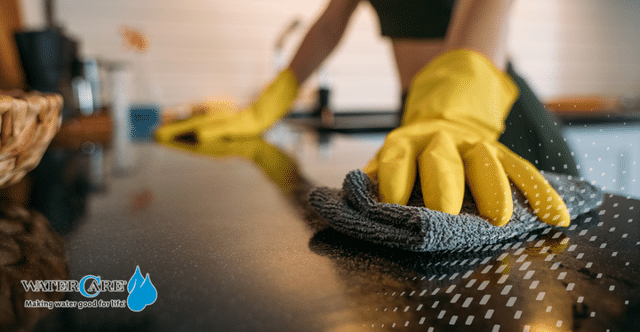Cleaning Your Home: Soft Water vs Hard Water

In the battle between soft water vs. hard water for home cleaning, soft water wins by a knockout!
The fact is, it’s more difficult to get your home really clean using hard water. That’s because hard water contains minerals such as calcium and magnesium. Those minerals interact and bind to certain particles in soap – decreasing soap’s effectiveness and making it harder to rinse away.
What’s more, scientists recognize that hard water makes disinfectants less effective too. Really! Keep reading for details and learn about the difference between soft water vs. hard water for household cleaning:
- Cleaning vs. Disinfecting
- The Germy Problem with Soap Scum
- Hard Water and Disinfectants
- Other Hard Water Cleaning Problems
Cleaning vs. Disinfecting
Let’s start with a reminder that there’s a difference between cleaning and disinfecting. These are actually two different processes.
When we clean, we use water plus soap or detergent to lift dirt and grime off surfaces. Soap works by trapping dirt and microbes in tiny bubbles called micelles. Those tiny “dirt traps” then wash away in water.
But cleaning alone isn’t a perfect way to remove germs. Sometimes your cloth or sponge can simply transport germs from one location to other. And some microbes are more resilient, making them less susceptible to soap’s natural germ-destructing properties.
When we disinfect, however, we eliminate or kill more of those germs and bacteria. What’s more, we limit their ability to reproduce. (That means even the ones that get left behind can’t divide and multiply!)
To be effective, cleaning and disinfecting should be a two-step process. First you clean to eliminate dirt, grime, and many microorganisms. Once that’s done, then you can disinfect to eliminate any lingering viruses and bacteria that may have been left behind.
Why isn’t disinfecting alone good enough? Soap is extremely destructive to microorganisms, so that’s always your best first step. Plus, germs can hide underneath little bits of dirt and grime. So, when you try to sanitize a dirty surface, you won’t reach all the viruses and bacteria. What’s more – germs may be able to feed off that dirt in order to reproduce!
The Germy Problem with Soap Scum
Hard water can make it harder to clean your home. That’s because the minerals in hard water can interact with the surfactants in soap. Together these minerals and surfactants clump up, creating soap scum.
Soap scum clings to your skin as well as your household surfaces. And just like dirt, that soap scum creates another place for viruses and bacteria to hide.
Norman Pace, a biology professor at University of Colorado at Boulder, studied the microorganisms that collect in this residue. “Soap scum is a lush bed of microbes,” Pace said in a press release issued by his university. His findings were also reviewed in the journal Nature.
Unlike hard water, washing in soft water generates a nice, sudsy lather and helps cleaning products rinse fully away. That means you get more out of your soap while avoiding that scummy buildup.
Hard Water and Disinfectants
Researchers have long known that hard water reduces the effectiveness of disinfectants. The effect is so well recognized, in fact, researchers from AOAC International (Association of Official Analytical Collaboration International) control for that when conducting official tests of detergents and sanitizers.
Information from the Centers for Disease Control and Prevention (CDC) helps explain why:
“Water hardness (i.e., high concentration of divalent cations) reduces the rate of kill of certain disinfectants because divalent cations (e.g., magnesium, calcium) in the hard water interact with the disinfectant to form insoluble precipitates.”
Other Hard Water Cleaning Problems
Germs and bacteria aside, hard water creates several other cleaning problems – from scratchy clothes to spotty dishes. Simply put, soap and detergents just don’t work as well in hard water. The minerals in hard water bond with soap, creating a small amount of residue that’s hard to wash away.
That’s why clothes washed in hard water, for example, can come out feeling stiff or coarse. That residue gets embedded into the fibers and accumulates until your towels start coming out of the wash stiff and rigid. Over time, washing clothes in hard water can degrade the fibers, fade colors, and shorten their life.
Hard water can cause spotting on glasses and dishware, too. The minerals in hard water are essentially dissolved rock, which gets left behind when the water comes in contact with heat in the dishwasher, leaving behind spots and film. These tiny pieces of dissolved water spraying your dishes every time you wash them can have a very abrasive effect. Cups and glasses can become etched after just a few months of washing in that kind of water, depending on how hard it is.
What’s more, hard water can contribute to stains and mineral buildup on your fixtures, showers, tubs, and sinks. Softening your water can eliminate that buildup and help keep your fixtures looking nicer longer.
Soft Water Helps Clean and Disinfect Your Home
Soft water vs hard water for home cleaning? It’s no contest! Of course, soft water alone won’t protect you from germs and other microorganisms. But soft water can increase how well your cleaning products and disinfectants work.
The reality is that most American homes (roughly 85%) do have hard water. Find out if you have hard water or other water quality issues. Talk to our water treatment specialists for your free assessment.
